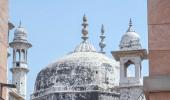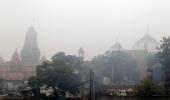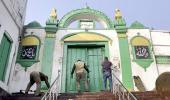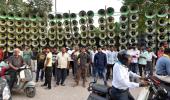The Supreme Court will hear a batch of pleas relating to the Places of Worship (Special Provisions) Act, 1991, on February 17.

As per the causelist for February 17 uploaded on the apex court's website, a bench comprising Chief Justice Sanjiv Khanna and Justices Sanjay Kumar and K V Viswanathan is slated to hear the matter.
The Act prohibits conversion of any place of worship and provides for the maintenance of the religious character of any place of worship as it existed on August 15, 1947.
However, the dispute relating to the Ram Janmabhoomi-Babri Masjid issue in Ayodhya was kept out of its purview.
Some of the pleas filed in the apex court have challenged the validity of certain provisions of the 1991 law.
On January 2, the top court agreed to examine a plea filed by AIMIM chief Asaduddin Owaisi seeking effective implementation of the places of worship law.
On December 12 last year, a bench headed by the chief justice, while acting on a batch of pleas relating to the 1991 law, restrained all courts from entertaining fresh suits and passing any effective interim or final orders in pending cases seeking to reclaim religious places, particularly mosques and dargahs.
The bench was hearing petitions, including the lead plea filed by lawyer Ashwini Upadhyay, challenging various provisions of the 1991 law.
The top court through its December 12 order effectively stalled proceedings in about 18 lawsuits filed by various Hindu parties seeking survey to ascertain original religious character of 10 mosques, including the Gyanvapi in Varanasi, Shahi Idgah Masjid in Mathura and Shahi Jama Masjid in Sambhal, where four persons' lives were snuffed out in clashes last year.
"As the matter is sub judice before this court, we deem it appropriate to direct that, though fresh suits may be filed, no suits would be registered and no proceedings shall be undertaken therein till further orders of this court," it had said.
The top court also said the primary issue that arises for consideration was with regard to Sections 3 and 4 of the 1991 Act and its contours, as well as the width and expanse of the said provisions.
While Section 3 deals with barring conversion of places of worship, Section 4 pertains to declaration as to the religious character of certain places of worship and bar of jurisdiction of courts, etc.
There are several cross petitions which seek strict implementation of the 1991 law to maintain communal harmony and to preserve the present status of mosques, sought to be reclaimed by Hindus on the ground that they were temples before invaders razed them.
Various Muslim parties, including the Gyanvapi mosque management committee, moved the apex court to oppose several pending petitions that challenge the constitutional validity of the 1991 law.
The mosque committee listed a series of contentious claims made over the years concerning various mosques and dargahs (shrines), including the Shahi Idgah Masjid in Mathura, the Quwwat-ul-Islam Masjid near Delhi's Qutub Minar, and the Kamal Maula mosque in Madhya Pradesh, among others.










 © 2025
© 2025